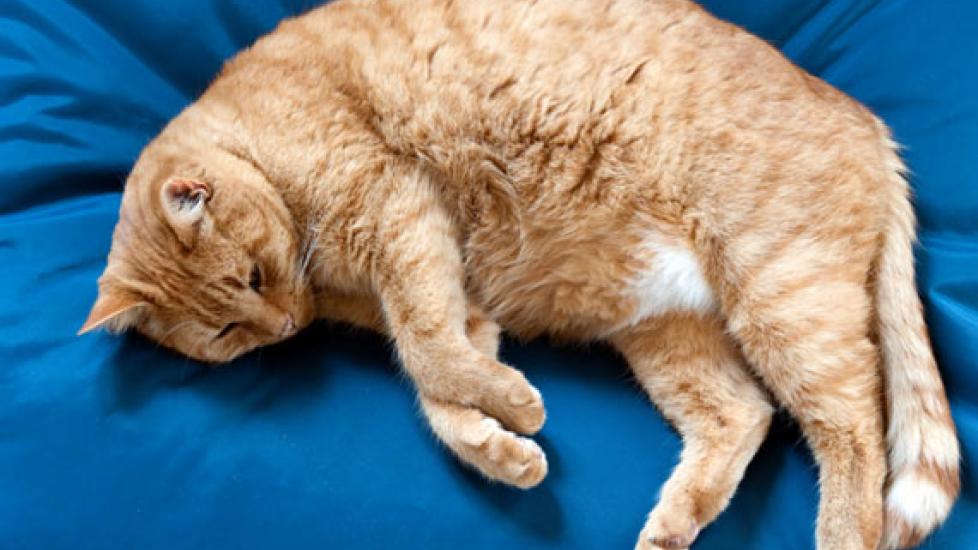Fat Loss Supplements for Pets
The last blog introduced Omega-3 fatty acids as a weight loss aid in pets. Weight loss supplements are well known in human weight loss but less utilized in pets. In addition to Omega-3s there are some other proven weight loss supplements. This post will discuss those supplements and list others that are purported to be effective aids but lack the scientific evidence to support such claims.
L-Carnitine
L-Carnitine is an amino acid like molecule that enhances the uptake of fatty acids into the mitochondria for energy production. Body cells produce energy by burning sugars, proteins and fats. Sugars can produce immediate energy without the need of oxygen. This can happen anywhere in the cell. For longer, more sustained energy, the body uses fats and proteins for energy but needs the cellular organ known as the mitochondria to do this. L-Carnitine is needed to shuttle fats from the body of the cell into these mitochondria. Studies in humans and animals have confirmed that subjects on a calorie restricted diet lose more weight if they are supplemented with L-Carnitine to facilitate this fat usage. This is an extremely safe and effective supplement that is readily available at markets, health food stores and pharmacies. Consult your veterinarian for a dosage for your pet.
L-Arginine
L-Arginine is another amino acid-like chemical. The veterinary community has yet to recognize its potentials, so studies are lacking in cats and dogs. An initial study in obese mice documented a 16 percent weight loss in ten weeks without calorie restriction. Abdominal fat was reduced by 45 percent. Fat energy utilization increased 22 percent and sugar energy utilization increased 34-36 percent. Abnormalities associated with diabetes also improved. Further studies in obese rats, pigs and humans confirmed these results. All studies documented an increase in muscle tissue of supplemented subjects.
Such findings offer promise for owners who are frustrated with weight loss in their pets, and could prove very helpful for pets needing to lose only a few extra pounds or for whom calorie restriction is difficult. Toy and small breeds are obvious candidates. Animals with diseases that could be complicated by calorie restriction would also be great candidates for L-Arginine supplementation. Again, consult your veterinarian for an appropriate dose.
DHEA
Dehydroepiandrosterone, or DHEA, is a steroid hormone involved with the production of testosterone and estrogen sex hormones. Studies have documented increased weight loss in calorie restricted weight loss patients receiving this supplement. The increase in sex hormones and their potential health side effects were of concern to the researchers in these studies. This supplement should be used with extreme caution and only under the supervision of a veterinarian.
Dirlotapide or Slentrol
Dirlotapide is a pharmaceutical drug that inhibits the transfer of dietary fats from intestinal cells into the blood stream. The accumulation of fat in the intestinal cells is thought to increase the release of intestinal hormones that signal fullness or satiety in the brain, reducing appetite. Four studies have documented that dogs being supplemented with dirlotapide lost 9.5-15 percent more weight than non-supplemented controls. Supplemented dogs did experience a 2.5-3.5 percent weight regain when dirlotapide was discontinued, however. Dirlotapide is only approved for use in dogs and is only available through veterinarians or a veterinary prescription.
Supplements Without Documented Effective Results
Conjugated Linoleic Acid, or CLA, is an omega-6 fatty acid without the documented results of the omega-3s. Chromium picolinate is widely touted as a "fat burning" aid in humans. There is no evidence to suggest that it is helpful in pets and DNA damage has been documented with its use. Starch blockers have proven to be useless in humans and animals. Chitosan, a compound from the shell of crustaceans, vitamin A, soy protein, flaxseed, and tamarind (a fruit) are often cited as diet aids without any scientific substantiation.
Ephedra, found in teas and other Chinese herbs as well as in caffeine, have been advocated as weight loss supplements. In addition to lack of evidence of effectiveness, these compounds can be very toxic to pets. Psyllium, the active ingredient in Metamucil, guar gum, spirulina, dandelion, casacara plant extracts and ginseng have all been promoted as weight loss supplements — without any scientific evidence to back the claims.
Bottom Line
There is no magic supplement solution to weight loss. Calorie restriction is the key. The aids like L-Arginine, L-Carnitine, Omega-3s and Dirlotapide may help, but weight loss requires commitment to a weight loss plan and, ultimately, a lifestyle change that includes a more appropriate feeding program along with consistent exercise.

Dr. Ken Tudor
Image: Javier Brosch / via Shutterstock
